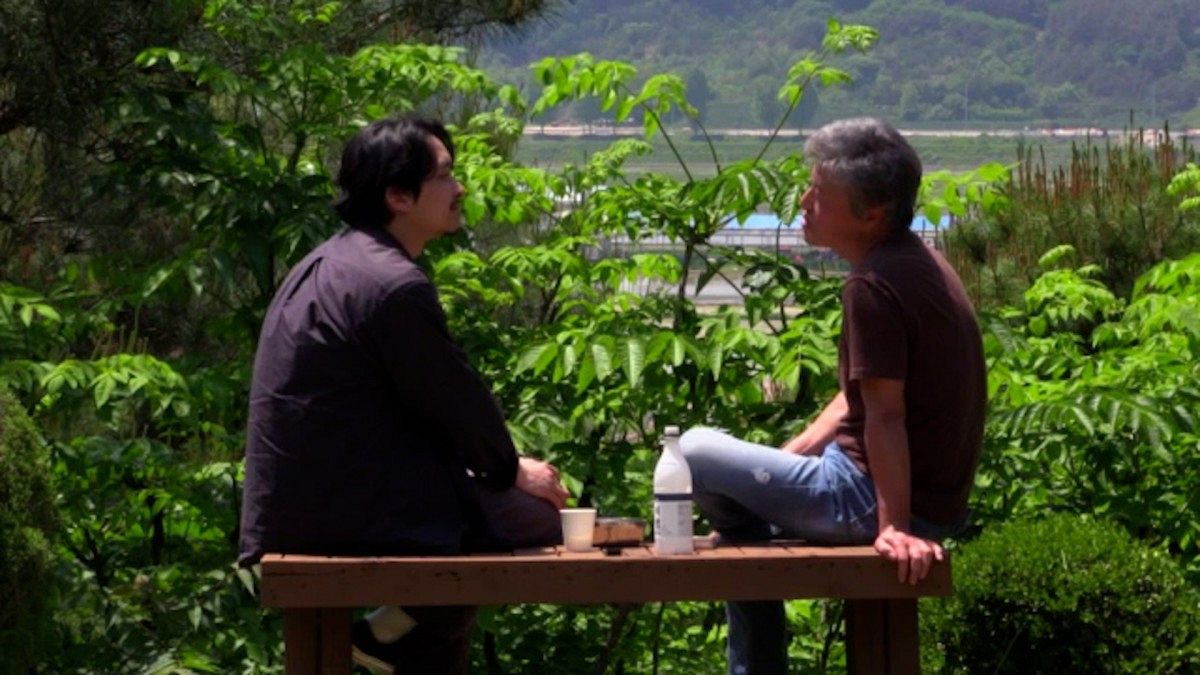Will the prolific director win yet another Bear? Possibly the Golden one? His 33rd feature is more worthy of awards than many of his previous Berlinale-winning films…
Is this the year the Berlinale finally gives South Korean filmmaker Hong Sangsoo the top prize?
In the last five years, the prolific director has won four gongs: Silver Bear for Best Director in 2020 for The Woman Who Ran; Silver Bear for Best Screenplay in 2021 for Introduction; Silver Bear Grand Jury Prize in 2022 for The Novelist’s Film; and Silver Bear Grand Jury Prize in 2024 for A Traveler’s Needs.
Berlin juries just can’t get enough, and a Berlinale Competition line-up would seem apparently incomplete without a Hong joint. The lunatic drive to constantly put his films up for awards seems to be pointing in one direction: the festival really wants to give him the Golden Bear once and for all. And as groan-worthy as it has become to witness his patronage-levels of inclusion in Competition, there is a strong case to be made for Geu jayeoni nege mworago hani (What Does that Nature Say to You) winning the top ursine this year.
We’d rather The Blue Trailwin it, but it can’t be denied that unlike his last three films, which felt like the director was cranking out on auto-pilot and indulging in all the Hong hallmarks (casual chats, soju a-go-go, plenty of meandering artists complaining), his 33rd feature is a deftly scripted and properly layered affair. With all the trimmings, naturally.
Written, shot edited, sound designed, produced and directed by Hong, it starts with struggling thirty-something poet Donghwa (Ha Seongguk) driving his girlfriend of three years, Junhee (Kang Soyi) from Seoul to her parents’ home outside Icheon. There, he discovers that her family house is bigger and fancier than he’d assumed. A chance encounter with Junhee’s father Oryeong (Kwon Haehyo) in the driveway turns the casual drop-off into a lengthy day with the whole family. Everything goes swimmingly with the father and the sister, but small cracks start to come to light as the day progresses, culminating in a signature drunken outburst during a home-cooked dinner with the mother Sunhee (Cho Yunhee), who also writes poetry.
Essentially, it’s Hong does Meet The Parents, and it’s by far his most accomplished film since The Woman Who Ran.
In telling the story of a family slyly vetting a suitor, Hong addresses the role of the artist in contemporary society and the economic anxieties that entails, as well as the unspoken gripes within families – specifically Donghwa’s own successful father, who seems to fuel within him a tension about his life and privilege. Since the film is shot in a deliberately casual, lo-res style that mimics the soft-focus in which Donghwa sees the world without his glasses, the audience are confronted with his headspace.
It’s hard not to see the character as a cypher for the director, who was born into a filmmaking family, and the way Hong candidly stages this would-be-artist having to face up to himself and what he considers to be his full-fledged calling is not only thought-provoking but often endearingly funny.
There are repeated jokes about Donghwa’s old car, his “artistic” moustache, and the third act in particular is highly entertaining – highlights being the in soju veritas dinner moment (“well, he completely flunked the alcohol test”) and the withering post-mortem about the potential son-in-law, conducted by the direct mother and the affable father. Both Kwon Haehyo and Cho Yunhee run away with it.
“A life spent pursuing beauty is great… right?” asks Donghwa, clearly trying to reassure himself.
It is great and worth pursuing, even if you have to address whether you may be guilty of indulging in overly romantic notions instead of truly connecting to your surroundings.
And what about a life spent pursuing the Golden Bear?
We’ll find out on results night this weekend.
What Does That Nature Say to You premiers at the 75th Berlinale in Competition.

